The Unified State Qualification Exam in Ukraine and Bogomolets National Medical University Under Covid-19 Conditionss
Nataliya V Obernikhina*, Tatiyana S Sanzhur and Ludmyla V Gayova
Department of Bioorganic and Biological Chemistry, OO Bogomolets National Medical University, Ukraine
Submission: August 25, 2021; Published: September 16, 2021
*Corresponding author: Nataliya V Obernikhina, Department of Bioorganic and Biological Chemistry, O O Bogomolets National Medical University, Ukraine
How to cite this article:Obernikhina N.V., Shanzhur T.S., Gayova L.V. The Unified State Qualification Exam in Ukraine and Bogomolets National Medical University Under Covid-19 Conditions. JOJ Pub Health. 2021; 6(1): 555679. DOI: 10.19080/JOJPH.2021.06.555679
Abstract
The study is devoted to the analysis of two stages of the USQE exam by higher medical universities of Ukraine in 2020 in the conditions of COVID-19. The national success rate of all universities in the country is 11.3% and is 6% higher than in 2019. The success rate of the second stage of the USQE exam also improved by 1.6% compared to 2019. The results of the USQE exam at the Bogomolets National Medical University (NMU) were considered in more detail and analyzed by subtests. It was shown that among all medical universities NMU by 1.2% in general gives a better indicator than the average in Ukraine. The highest result of success in NMU was shown by the 2nd medical faculty, its indicator makes 79.7%. The disciplines such as Normal Physiology and Pharmacology were best compiled at NMU. The success trends of NMU generally coincide with the success of Ukraine.
Keywords: Unified State Qualification Exam; “Krok 1” exam; Bogomolets National Medical University; analysis of results; faculty development; medical education in COVID-19
Introduction
The COVID-19 pandemic has led to the transformation of medical education. New forms and methods of education have become increasingly important since quarantine beginning, especially in the process of training doctors. Therefore, online education requires new approaches to the organization of individual assignments, self-education approach. The national strategy of development of education in Ukraine on a period to 2021, that is approved by Decree of President of Ukraine from 25.06.2013 № 344/2013 [1], among basic tasks determines the development of thinking, oriented to the future, further modernization, and development of education on European principles, upgrading of the quality of education on the innovative basis. The quality assurance system implemented for the higher education of Ukraine at the sectoral level includes the rating of higher medical institutions and Unified State Qualification Examinations (USQE), which have been implemented since 1998 by the State Organization “Center for Testing the Professional Competence of Professionals with Higher Education in the Areas of Training “Medicine”, “Stomatology” and “Pharmacy” at the Ministry of Health of Ukraine [2]. Starting in 2019, third-year students is held for entrants to the second stage of “master’s degree” majoring in “Medicine”, “Pediatrics”, “Medical Psychology”, “Stomatology”, “Pharmacy” pass the first stage of Unified State Qualification Examination (USQE), which consists of the following components such as integrated test exam “Krok 1” (hereinafter - the “Krok 1” exam); objective structured practical (clinical) exam (hereinafter - practical (clinical) exam); professional English exam. The main principles of the qualifying exam are objectivity, transparency and publicity, independence, intolerance of corruption and bribery, integration into the international educational and scientific space, mandatory, unity of methods of evaluation of results. Professional competence is diagnosed as the ability to apply the knowledge and understanding of the basic biomedical sciences and basic medical disciplines, which are the most important for providing care to the patient under the surveillance of a more experienced physician [3]. The focus is on maintaining health, preventing disease, and organizing timely quality care. The Regulations on the Order of realization of the Unified State Qualification Examination for applicants of a degree of higher education the master on specialties of knowledge field “22 Health care”, approved by the order of the Ministry of Health of Ukraine of 28.03.2018 №334, for the first time normalized the system of quality assurance of medical education in the direction “Medicine”, “Pediatrics”, “Stomatology” and “Pharmacy”. The purpose of the licensed integrated examination is to establish the level of professional competence of the graduate (intern) to the minimum required level following the requirements of the State Higher Education Standards [4]. LIE “Krok”, which is used in Ukraine, have also undergone professional expertise in the world’s leading certification centers, namely: the National Board of Medical Examiners (NBME, USA), the Center for Medical Education (CME, England), and the Institute of Content and Learning Methods of MES of Ukraine, Institute of Pedagogy and Psychology of Professional Education of APS of Ukraine. At the decision of the World Conference, the Licensing Examination Program of Ukraine was recommended to other countries that introducing licensing or certification exams as a model for use [5].
In 2020, the organization and conduct of the USQE were provided in the conditions of quarantine in Ukraine in accordance with the approved interim recommendations for the organization of anti-epidemic measures for the certification of students in the field of knowledge “22 Health”, aimed at preventing the spread of acute respiratory disease COVID-19. To prevent the spread of pandemic coronavirus COVID-19 was introduced experienced cancellations of all clinical placements into the beginning of last year, both in Ukraine and in most countries, including the United Kingdom [6]. In this regard, such a component of the USQE as a practical (clinical) exam has been transferred from these terms to less epidemically threatening.
Since online learning is now important in continuing medical education, the aim of our study was to analyze the results of the USQE of the Bogomolets National Medical University from the point of view of higher medical educational institutions of Ukraine.
Literary Review
Introducing independent evaluation of applicants for higher medical education is one of the main achievements of the use of the credit-module system for the organization of the educational process and the European Credit Transfer System [7]. The USQE is a reflection of the student levels of knowledge in basic disciplines, which includes the disciplines of 1-3 courses: human anatomy; biology; biological chemistry; histology, cytology, and embryology; virology and immunology; physiology; pathological physiology; pathological morphology; pharmacology. Researchers note a clear relationship between academic success and the results of “Krok 1” in both Ukrainian and foreign medical schools [8,9]. Show a clear correlation between the results of examinations in all educational programs, first and second courses and evaluation of medical licensing examinations USA (USMLE) Step 1 [10,11]. Although recently there are a number of conflicting opinions about the compliance of the “Krok 1” exam with the set goals, primarily measuring knowledge about foundational sciences and organ systems [12]. A site forum was officially introduced that plays an important role in shaping medical student culture and study habits, as well as a national discussion on United States Medical Licensing Examination Step 1 reform [13]. The low level of knowledge of the majority of entrants causes their low academic success, which is reflected both during the semester exams in the disciplines and on the “Krok 1” exam [14-18]. Therefore, it is of great importance for students to perform in practical classes of each of the disciplines the test tasks offered by the Testing Center and to solve the situational tasks and clinical cases built based on these test tasks [19]. Holding lectures and consultations on subjects covered by the “Krok 1” exam provides students with the opportunity to understand the connections between individual sections of the discipline and interdisciplinary communications [20]. One of the factors promoting the improvement of the success of medical students in the preparation of the “Krok 1” exam is to determine the index of complexity of tests on each topic and to consider typical mistakes during pretesting [21]. The control of students’ independent preparation for the exam using the Moodle distance learning system significantly improves the results of the “Krok 1” exam [22]. The implementation of several intermediate controls makes it possible to evaluate the dynamics of students’ independent work during preparation for the “Krok 1” exam [23]. The research [24] have shown that students consider self-control to be the most effective way to prepare for “Krok 1” exam. Most students prefer to test using an online test system that allows remote access to computer classes; the test system after passing the test allows you to get acquainted with the correct answers and understand which sections of the training material should be given more attention during preparation.
Results and Discussion
Analysis of the results of the first stage of USQE “Krok 1” exam by the students-citizens of ukraine
In accordance with the approved interim recommendations on organization of anti-epidemic measures during the certification of students in the field of knowledge “22 Health Care” September 22 and 23, 2020, the Testing Center held the first stage of the Unified State Qualification Exam for the ukrainian applicants. USQE was conducted in 18 institutions of higher education (hereinafter - HEI), see (Table 1). The “passed” criterion was established in 2020 by the order of the Ministry of Health of Ukraine dated 25.06.2020 № 1455 “On approval of the value of the “passed” criterion for the integrated test “Krok 1” exam and the professional English exam version of the order of the Ministry of Health of Ukraine dated 30.10.2020 № 2477) in connection with the established quarantine restrictions due to the spread in Ukraine of acute respiratory disease COVID-19 caused by coronavirus SARS-CoV-2, at the level of:
55.5% correct answers for the “Krok 1” exam.
30.5% for the English Language exam.
According to the current legal framework, in case of noncompilation of any of the components of USQE, the applicant has the right to re-compile it no more once. Due to the complex epidemic situation caused by the spread of coronavirus disease, in Ukraine the exam was conducted in 2 stages, specified on different dates. In the further research for a comparison of results of difficult examination with the last years, we will use averaged indicators of two stages. For passing the Unified State Qualification Exam, according to the higher education institutions, 6447 students of Ukraine were registered, which is ~ 16% less than in 2019. The first stage of USQE consisted of 6447 entrants - citizens of Ukraine, including 24 in the specialty “Medical Psychology”, 425 in the specialty “Pediatrics”, others - in the specialty “Medicine”, of which 3803 entrants for the budget and 2644 entrants for contract education [24]. The results of exam success are collected in (Table 2).
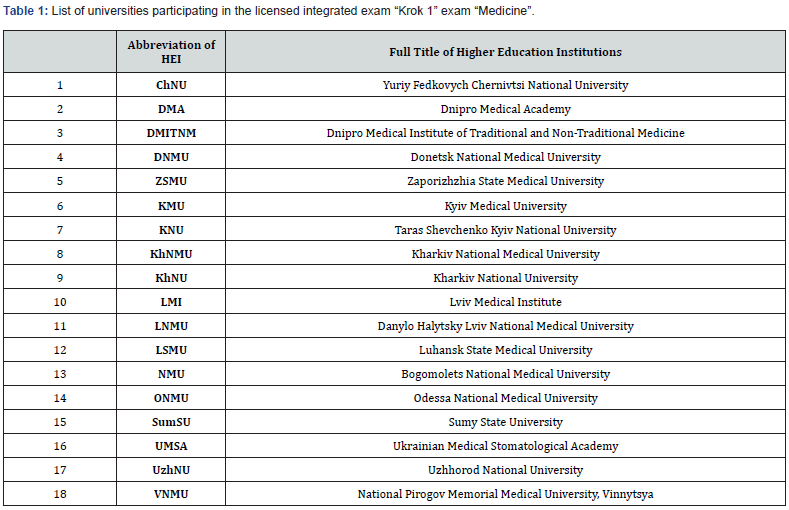
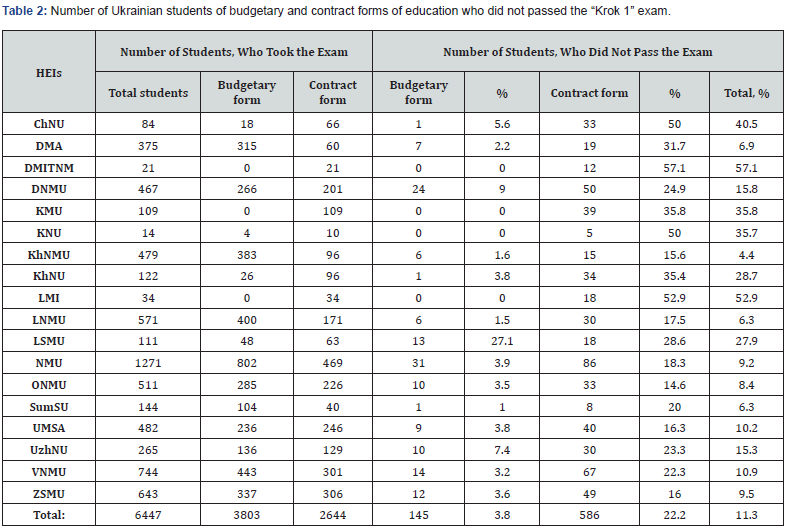
As can be seen from (Table 2), the “Krok 1” exam did not pass the students in Ukraine. The average number of applicants who did not pass the first stage USQE in Ukraine is 731, which is 11.34 % in total. It should be noted that students of the contract form of education, who did not pass the exam, three times more than students of the budget form of education. Only 9 universities in Ukraine showed better results than the national indicator. They include DMA, ZSMU, KhNMU, LNMU, NMU, ONMU, SumSU, UMSA, VNMU. Among the other HEIs that participated in the test, KhNMU (4.4 %) was the most successful, followed by LNMU and SumSU (6.3%). NMU as the largest medical university in Ukraine in the number of students and specialties, is the fifth with the result of 9.2 %. In 2020, KNU and ChNU joined universities with medical faculties, but as can be seen from (Table 2), the national success rate, unfortunately, is very low: 35,7 and 40,5 %, respectively. Consider the dynamics of success of HEIs that have overcome the barrier of 11,34% in recent years. The results are shown in (Figure 1). As can be seen from (Figure 1), the results of the first stage USQE in Ukraine during quarantine in the context of the spread of coronavirus COVID-19 in compliance with antiepidemic measures are much better than in previous years across the country (see also national average). According to average statistical indicators, the most successful in 2015-2020 were HEIs such as DMA, LNMU, NMU. Their success rate did not exceed the national average. In ONMU, SumSU, UMSA and VNMU the success rate has improved significantly in recent years, as has the success rate of Ukraine as a whole. This trend has developed due to the fact that in order to reduce the length of stay of students and interns during exams in personal protective equipment (protective mask, respirator), reduced the number of test tasks from 200 to 130 and, accordingly, the duration of the exam by 1 hour, which reduced psychoemotional stress in students and interns and helped maintain their concentration during the “Krok 1” exam. After the exam, the analysis was performed annually psychometric characteristics of test tasks and determination of their validity. In 2020, all test tasks met the established world requirements. Which has a positive impact on the outcome of the first stage USQE the “Krok 1” exam of the whole country.
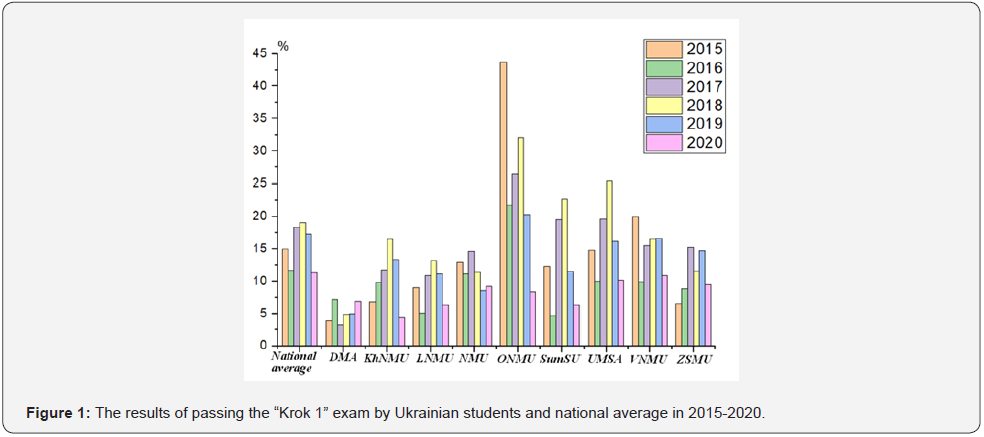
Analysis of the results of the second stage of USQE professional english language exam by the studentscitizens of ukraine
The professional English language exam is the second component of the USQE exam, which tests a student’s ability to master literature in English. After all, English is the most widely used language in medical science, so the student must have a basic level of English to gain relevant knowledge. The exam is held in the format of a test in one day together with “Krok 1” exam. However, this exam is a separate component for which the student receives a separate result. The exam in a foreign language for professional purposes will be taken by all specialties of the field of knowledge 22 “Health Care”. The professional English language exam in Ukraine has been held since 2019, so we will consider the results of compiling this component USQE exam in 2020 compared to last year, as can be seen in (Table 3). As can be seen from (Table 3), the Professional English Exam in 2020 is much better than in 2019. Student performance has almost doubled. Undoubtedly, compliance with the quarantine conditions of the exam, removal of psycho-emotional stress in students and analysis of psychometric characteristics of test tasks have only positive results. Despite this, universities such as DNMU and LMI in 2020 showed a lower success rate than in 2020. And such universities as ChNU, DMITNM, KMU, LSMU and UzhNU in both 2019 and 2020 have low success rates above the norm.
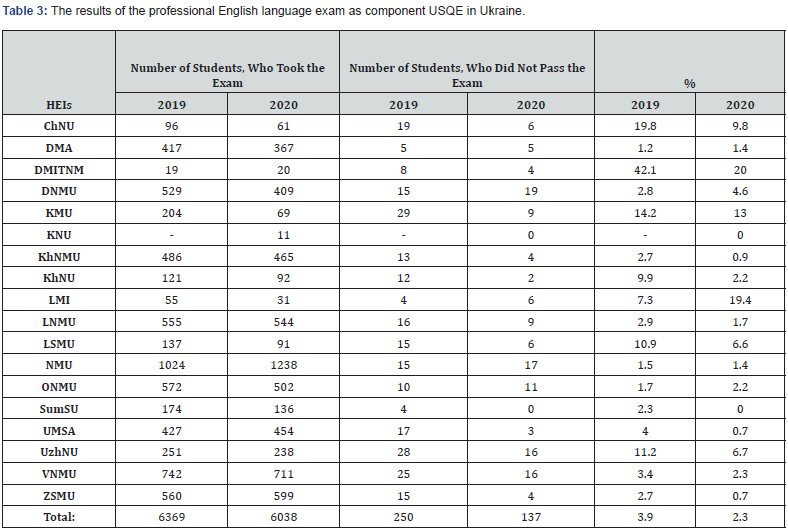
Analysis of the results of the USQE exam by the studentscitizens of ukraine by subtests
USQE exam seems after learning the basic fundamental disciplines, consisting of general scientific disciplines in the following subtests: biology (6-8 %), normal anatomy (9-11 %), histology (4-6 %), normal physiology (13-17 %), biochemistry (13-17 %), pathological physiology (13-17 %), pathological anatomy (10-14 %), microbiology (7-9 %), pharmacology (11-15 %). We will analyze the national average of the results of the first stage of the USQE “Krok 1” exam in the form of test control by applicants-citizens of Ukraine for subtests for the last five years. In (Figure 2a) is shown the dynamics of changes in the results of the passing the subtests of the “Krok 1” exam by Ukrainian students by subtests: biology, normal anatomy, histology, normal physiology, and biochemistry. (Figure 2b) is shown the dynamics of changes in the results of the passing the subtests of the “Krok 1” exam by Ukrainian students by subtests: pathological physiology, pathological anatomy, microbiology, pharmacology, and national average. As can see from (Figure 2a and 2b), compared to previous years [14-18], in 2020 student performance improved in subtests, such as normal anatomy (increased by 10.7%), normal physiology (increased by 4.3%), biochemistry (increased by 1.3%), pathological physiology (increased by 3.3%), microbiology (increased by 6.0%), pharmacology (increased by 6.2%) in compared to 2019. Undoubtedly, the best results in improving the success rate were achieved by subtests in normal anatomy (increased by 10.7%). In such disciplines as biology (decreased by 9.8%) and histology (decreased by 4.0%), the results of performance have significantly deteriorated, the success rate of subtests in pathological anatomy has remained at the same level. Analyzing the overall national indicator, it is safe to say that Ukraine as a whole passed the USQE exam better than in previous years, finally achieving success in 2016. As a result, it should be noted that the results of the subtest USQE exam in 2020 have improved, despite the difficult epidemic situation in Ukraine with COVID-19.
The results of the passing the USQE exam by the students of the bogomolets national medical university
We will analyze the results of the USQE exam by the students of the 3rd year of the Bogomolets National Medical University in 2020 in terms of the national success rate of Ukraine. In the (Figure 3) are presented the results of the USQE exam by the studentscitizens of Ukraine of the Bogomolets National Medical University for the last three years by the subtests. As can be seen from (Figure 3), NMU passed the exam better on almost all subtests, except for subtests in microbiology, and passed the “pharmacology” at the same level as Ukraine as a whole. It should also be noted that the success rate of NMU is higher than the success rate of Ukraine. Consider the dynamics of success of students of the National Medical University on subtests from 2017 to 2020 [15-18] (see Figure 4). First of all, it should be noted that the success rate of NMU from 2017 to 2019 had a positive growth dynamic, and only in 2020 decreased by 0.7 %, although it is higher than the national indicator of Ukraine as a whole. Compared to previous years, the success rate for such subtests as normal anatomy (increased by 10.3 %) and microbiology (increased by 4.1 %) has significantly increased; significantly decreased in such subtests as biology (decreased by 11.1 %), histology (decreased by 6 %), biochemistry (decreased by 2.3 %) and pathological anatomy (decreased by 7.3 %), and the success rate of such a subject as pharmacology and pathological physiology remained unchanged. Note that the NMU in terms of performance has a general trend, as in Ukraine (see paragraph 3.3), except for such subtests as biochemistry and pathological anatomy. Departments that read these subjects need to think about changing teaching methods. Consider the results of passing the first stage of USQE “Krok 1” exam by Ukrainian students of the 1st, 2nd, 3rd and 4th medical faculties, medicalpsychological faculty and faculty of training doctors for the armed forces of Ukraine (FTDAFU) of the Bogomolets National Medical University are shown in (Table 4).
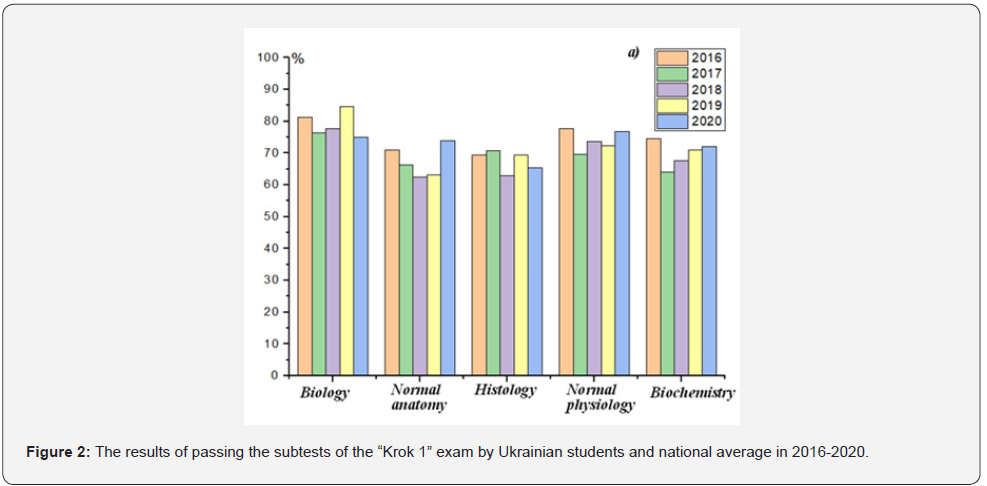
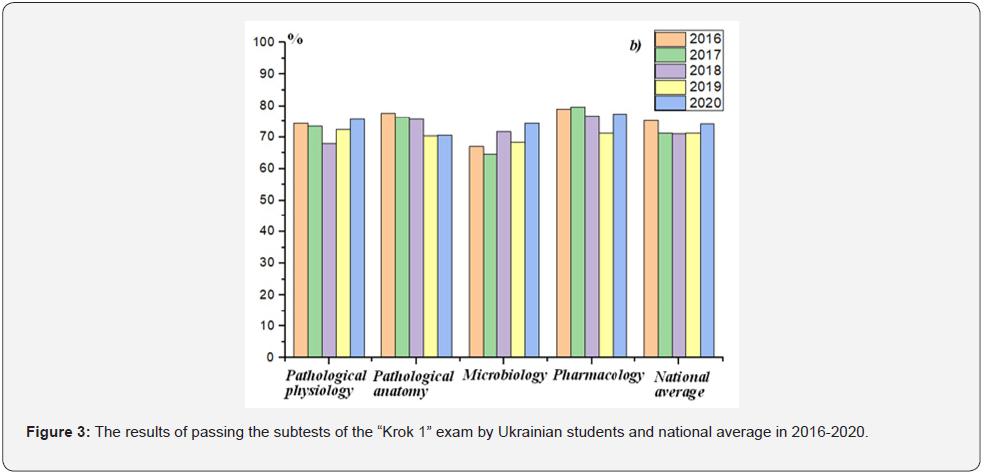
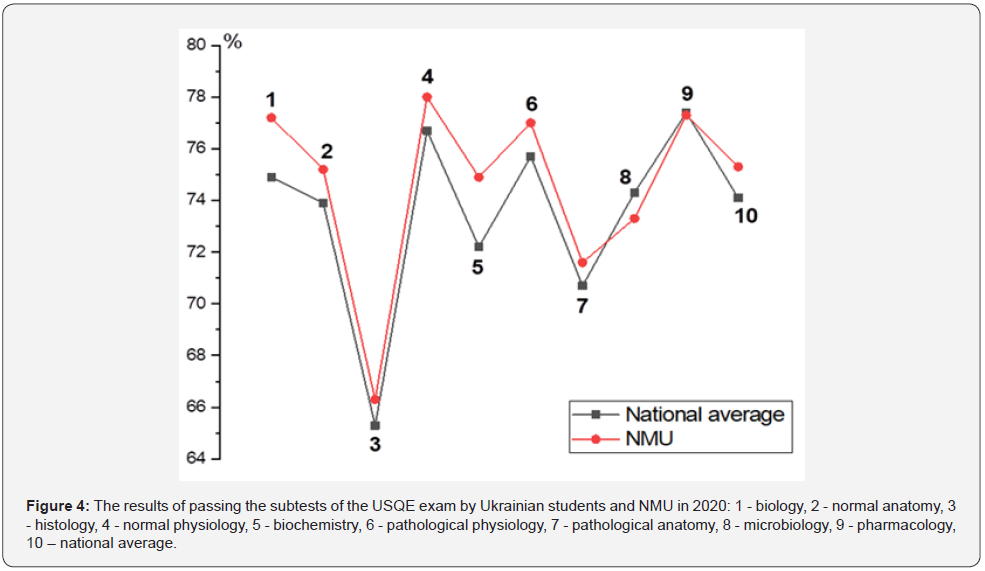
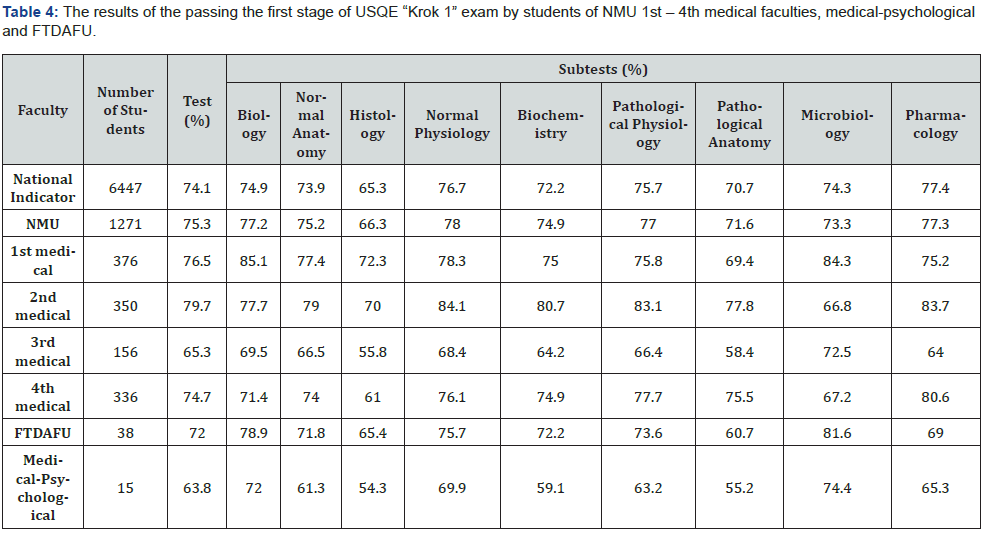
As can be seen from (Table 4), the Ukrainian students only of 1st and 2nd medical faculties of the Bogomolets National Medical University have passed the first stage of USQE “Krok 1” exam above the level of the national indicators of Ukraine and the overall success rate NMU. Without a doubt, the 2nd medical faculty became the leader of the NMU in 2020. The 4th medical faculty passed the exam within the country’s success rate but was 0.6% lower than the NMU. Faculties such as FTDAFU (72%), 3rd medical (65.3%) and medical-psychological (63.8%) showed lower results than NMU and Ukraine as a whole. The weakest was medical-psychological faculty, its success rate is 63.8%, but it is higher than the rate of passing, established by the Ministry of Health of Ukraine as an absolute criterion “passed/failed” - 55.5% of the correct answers. According to many subtests, the results of the medical-psychology faculty did not pass such disciplines as histology (1.2% lower than the set criterion) and “Pathological anatomy” (0.3% lower than the set criterion). We will analyze the results of passing the first stage of the USQE “Krok 1” exam by students of the faculties of the National Medical University over the past three years, as can see from (Figure 5) [16-18]. Having analyzed the success of the exam of all faculties of NMU, we can say that the results of the 2nd (increased by 2.3 %) and 4th (increased by 3.5 %) medical faculties are steadily improving. The success rate of 2nd medical faculties has been steadily declining over the last three years (decreased by 8.5 %). The success rates of 1 medical, FTDAFU and medical-psychological faculties for the last three years are not stable: from 2018 to 2019 we see an increase in the indicator, and from 2019 to 2020 - on the contrary - a decrease. Such tendencies, undoubtedly, affect the work of the dean’s office on the organization of education and preparation of students of the relevant faculty for the USQE “Krok 1” exam. (Figure 6) shows the results of passing the subtests of the “Krok 1” exam of the faculties of the NMU in 2018-2020.
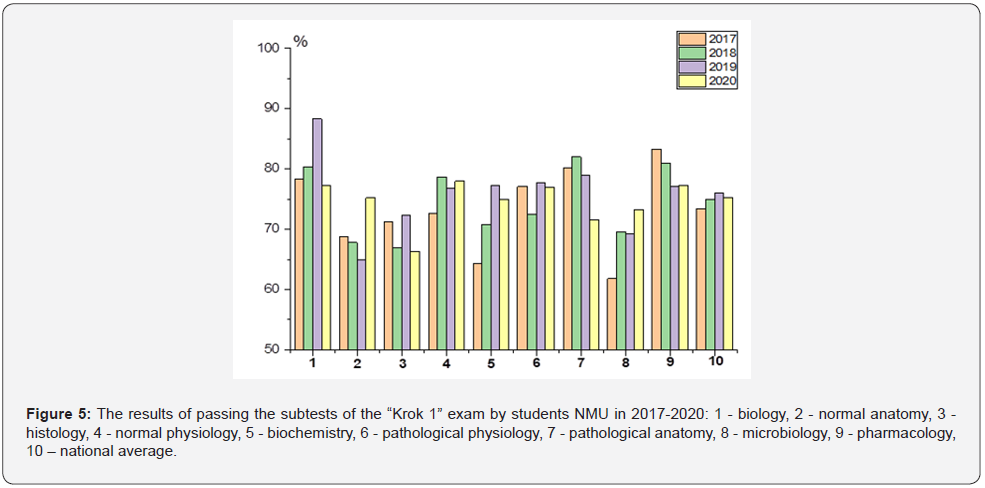
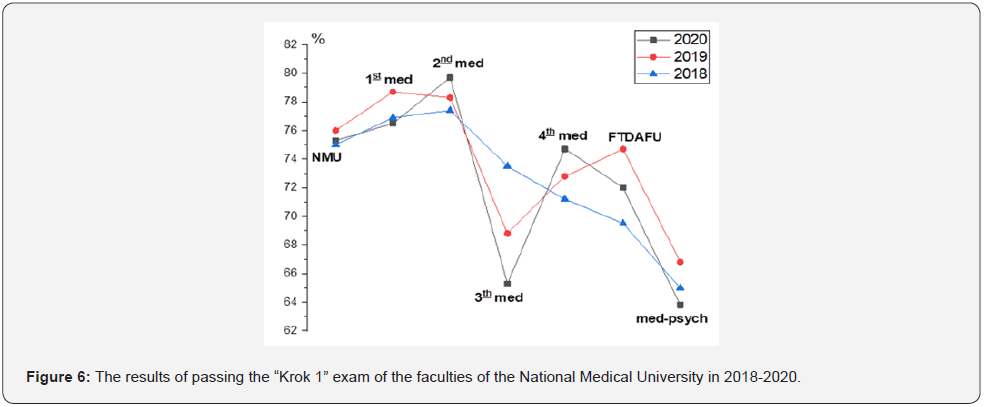
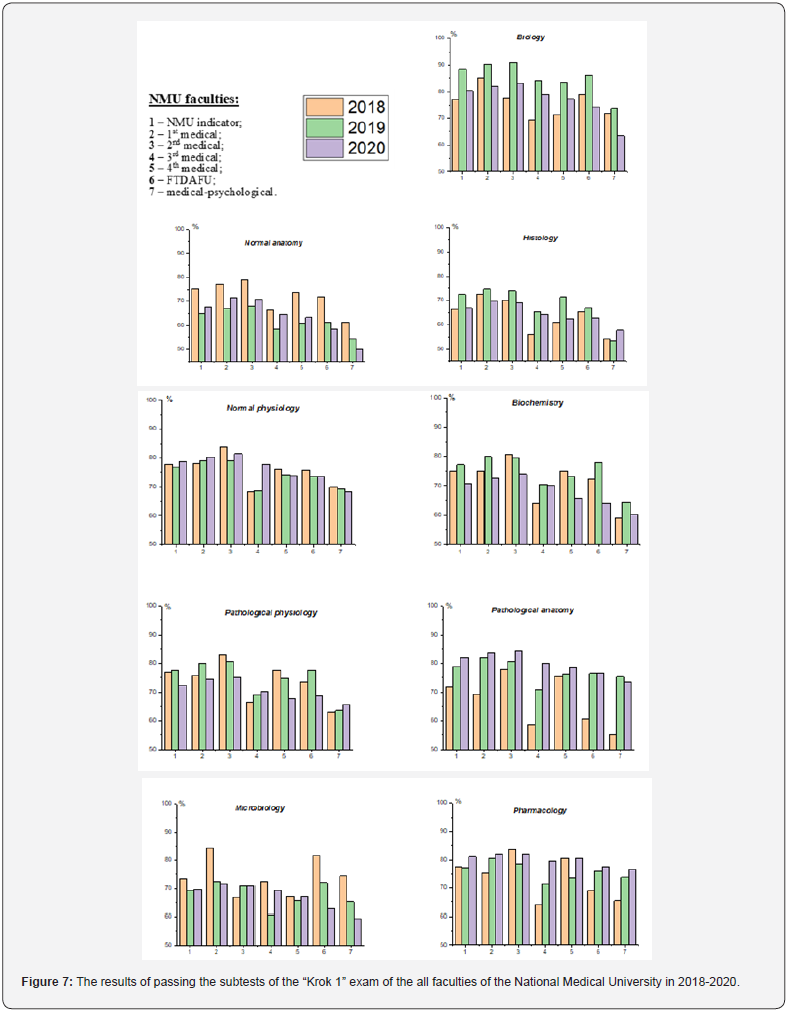
As can be seen from (Figure 6), the tendencies of passing the the USQE “Krok 1” exam by the faculties of NMU correlate with the tendencies of passing the exam all over Ukraine. There is a clear decrease in the performance of 3rd medical faculty both in 2019 and in 2020 compared to 2018. It should also be noted that the performance of NMU and individual faculties is consistently high during 2018-2020 for disciplines such as biology, normal physiology, and pharmacology, and for disciplines such as microbiology, histology and normal anatomy the prevalence remains low. Consider the results of NMU success for each of the subtests separately. The results of biology were much better in 2019, in 2020 most faculties were more successful than in 2018, except for the medical and psychological faculty. Approximate results are observed in such a subtest as histology. Regarding the success of NMU students in normal anatomy, the best result was observed in 2018, in 2019 - the lowest, and in 2020 there is an attempt to increase performance. Approximate results are observed in such a subtest as microbiology. For disciplines such as normal physiology, biochemistry, there are fluctuations in performance between 2018 and 2020. It should be noted the success of such disciplines as pathological anatomy and pharmacology. The result of success improves significantly every year. Even weak faculties, such as medical-psychological and 3rd medical, have a high enough result of success. Such observations, of course, demonstrate the quality of work of departments with different faculties of NMU.
Analysis of the results of the second stage of USQE professional english language exam by the students of the bogomolets national medical university
Since the professional medical exam in English in Ukraine has been held since 2019, we will analyze the results of this component of the USQE exam in 2020 compared to last year at NMU by all faculties. The results are summarized in (Table 5). As can be seen from (Table 5), the Professional English Exam in 2020 is much better than in 2019. Ukrainian student performance has almost doubled. But the results of the success of the National Medical University have deteriorated slightly. Consider the contribution to the overall success of each faculty separately. As can be seen from (Table 5), the greatest success in the exam is observed in the Faculty of Medicine and Psychology. The 2nd and 4th medical faculties also improved their results. But the worst result was demonstrated by the FTDAFU: the success rate of professional English writing decreased by 7.8%.
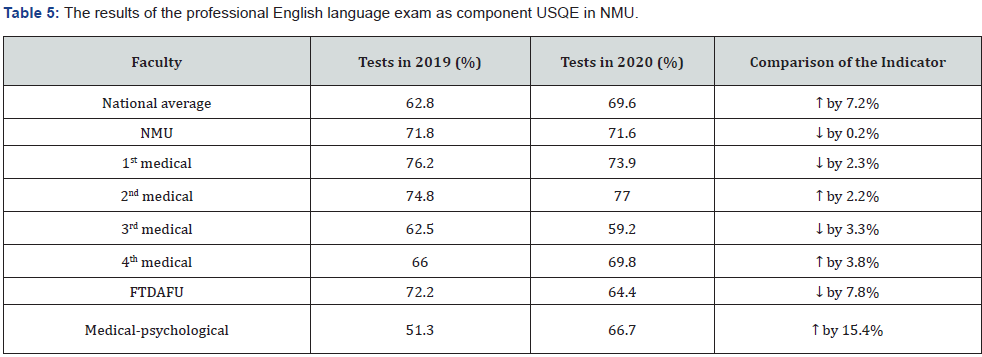
Conclusion
The study analyzed the results of the first stage of the USQE exam by higher medical universities of Ukraine in 2020 in a pandemic СOVID-19. As can be seen, the national success rate of all universities is 11.3% and was higher by 6% than in 2019. Of the 18 universities that took part in the exam, 9 of them did not pass the national barrier. The results of the second stage of the USQE exam in Ukraine turned out to be better (success rate increased by 1.6%) than in 2019. According to the subtests that make up the USQE exam, the best results in 2020 were demonstrated by normal anatomy, normal physiology, pathological physiology, microbiology, and pharmacology. The success of passing the USQE exam by students of the Bogomolets National Medical University as one of the leading higher medical educational institutions of Ukraine was also analyzed. The success of passing the USQE exam by students of the Bogomolets National Medical University as one of the leading higher medical educational institutions of Ukraine was also analyzed. The success rate of NMU both as a whole and by subtests in 2020 is higher by 1.2% than the national average of Ukraine. The subtest in normal physiology was passed best, the lowest - in histology. The 2nd medical faculty was the most successful in passing the USQE exam, the lowest results were shown by the medical-psychological faculty; these results are within the criterion of “passed” 55.5% of the correct answers for the exam “Krok 1” exam and 30.5% for the English language exam. Results of passing the USQE exam by students of National Medical University completely correlated with average values of passing over the country in recent years. It should be noted that the results of the USQE exam in 2020 have improved, despite the difficult epidemic situation in Ukraine with COVID-19, which reduced the number of test tasks from 200 to 130 and, accordingly, the duration of the exam by 1 hour. Such measures led to a reduction in psycho-emotional stress in students and to maintaining concentration during the USQE exam.
Availability of Data and Materials
The datasets used and/or analyzed during the current study available from the corresponding author on reasonable request.
Acknowledgement
The authors thank the administration of the Bogomolets National Medical University for opportunity to conduct research.
References
- Stukalo N, Simakhova A (2020) COVID-19 Impact on Ukrainian Higher Education. Univ J Educat Res 8(8): 3673-3678.
- Finikova OI, Sharova, Takson (2014) Monitorynh intehratsiyi ukrayinsʹkoyi systemy vyshchoyi osvity v Yevropeysʹkyy prostir vyshchoyi osvity ta naukovoho doslidzhennya monitorynh. doslidzh. Analit zvit Mizhnarod blahod Fond Mizhnarod Fond doslidzh osvit polityky, 144 P.
- Stechenko OV (2015) Еuropean Integration Based Changes in Higher Medical and Pharmaceutical Education Near Future Opportunities. Lûdinoznavčì studìï Pedagogìka 1(33): 202-211.
- S Bibliohr V, Kintsi hl, K Karavela (2008) Palʹchevsʹkyy SS Pedahohika [Tekst] navch posib dlya stud vyshch navch zakl Druhe vyd 496.
- Case SM, Swanson DB (2002) Constructing written test questions for the basic and clinical sciences. Philadelphia PA National Board of medical Examiners 180.
- Sandhu P, De Wolf M (2020) The impact of COVID-19 on the undergraduate medical curriculum. Med Educat Online 25(1): 1764740.
- Lakshmanan M (2019) Effect of Negatively Framed MCQS In The Medical Education. World Journal of Pharm Res 8(5): 125-131.
- Chen DR, Priest CK, Batten JN, Fragoso LE, Reinfeld BI, et al. (2019) Student Perspectives on the Step 1 Climate in Preclinical Medical Education. Acad Med 94(3): 302-304.
- Stowell JR, Bennett D (2010) Effects of online testing on student exam performance and test anxiety. J Educ Comput Res 42(2): 161-171.
- Jonson TR, Khalil MK, Peppler RD, Davey DD, Kibble JD (2014) Use of the NBME comprehensive basic science examination as a progress test in the preclerkship curriculum of a new medical school. Adv Physiol Educ 38: 315-320.
- Donnon T, Paolicci EO, Violato C (2007) The predictive validity of the MCAT for medical school performance and medical board licensing examinations a meta-analysis of the published research. Acad Med 82(1): 100-106.
- Andolsek KM (2019) One Small Step for Step 1. Acad Med 94(3): 309-313.
- Ronner L, Linkowski L (2020) Online Forums and the Step 1 Climate Perspectives From a Medical Student Reddit User. Acad Med 95: 1329-1331.
- Gayova LV, Litvinova NYu, Obernikhina NV, Kefeli Yanovska OI (2015) Analysis of the results of taking the licensed integrated examination Krok-1. General medical preparation of students of 2nd medical faculty of the National Medical University Nauk zap (Ped nauky) 128: 24-35.
- Hayova LV, Obernikhina NV (2016) The results of taking the licensed integrated examination Krok-1. General medical preparation of students of 2nd medical faculty of the National Medical University Nauk zap (Ped nauky) 131: 67-80.
- Obernikhina N, Yanitskaya L, Sanzhur T, Pradiy T (2018) Licensed integrated examination Krok-1 Medicine in the Bogomolets National Medical University as education quality control indicator. ScienceRise Ped Educat 4(24): 9-15.
- Obernikhina NV, Kramarenko IS, Hayova LV (2019) Licensed integrated examination Krok1 Medicine in the Bogomolets National Medical University as one of the factors of the quality assurance system of medical education. East European Scientific Journal 41(1): 17-26.
- Obernikhina N, Sanzhur T, Kramarenko I, Hayova L (2020) Krok 1 Medicine in Bogomolets National Medical University as Education Indicator. Higher Education Research 5(5): 181-192.
- Stechenko OV, Ostapyuk LI (2016) Optymizatsiya orhanizatsiyi navchalʹnoho protsesu na kafedrakh universytetu yak vazhlyva skladova vnutrishnʹovuzivsʹkoyi systemy upravlyannya yakistyu, Klinichna ta eksperymentalʹna patolohiya 15(2): 108-111.
- Hayova LV, Yanitska LV, Obernikhina NV, Sanzhur TS (2017) Licensed integrated examination Krok-1. Stomatology in the Bogomolets national medical university as education quality control indicator: inter-dissiplanal integration, Monitoring aspect. ScienceRise Ped Educat 7(15): 15-18.
- Panasenko NV, Perepelytsya OO (2015) Methodical approaches to organization of introductory lectures for effective training of pharmacists in organic chemistry in course of their preparation for integrated licensing examination Step 1. Pharmacy Buk Med Herald 19(4): 248-252.
- Kuznyak NB, Bambulyak AV, Honcharenko VA, Dmytrenko RR (2014) Distance learning system as an effective part of the preparation of doctor’s interns to integrated licensing examination Krok 3. Stomatology Molodyy vchenyy 7(10): 119-120.
- Oliynyk IYu (2012) Vykorystannya suchasnykh informatsiynykh tekhnolohiy dlya samopidhotovky studentiv do litsenziynoho ispytu Krok 1. Stomatolohiya, Klinichna anatomiya ta operatyvna khirurhiya 11(2): 126-129.
- Hrynkiv YaO, Revyatskyy IYu, Zaliska MO (2019) Optimization of methodology of education, self-education, and level knowledge control of pharmacists-interns for Krok 3 Pharmacy. Farmatsevtychnyy zhurnal 74(5): 54-63.
- Analitychna dovidka z tsentru testuvannya internet-resurs.






























